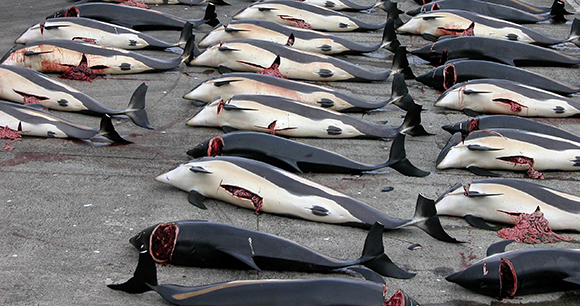
Washington, London, Munich—A shocking new report released today reveals that more than 100,000 dolphins, small whales and porpoises (small cetaceans) are slaughtered globally in hunts each year—many to be used as fishing bait. Most of these hunts are unregulated, illegal, and unsustainable, with potentially wide-ranging adverse impacts on small cetacean populations.
The report, “Small Cetaceans, Big Problems,” by the Animal Welfare Institute (AWI), Pro Wildlife and Whale and Dolphin Conservation (WDC) also identifies the world’s worst dolphin-hunting nations and examines the intense cruelty associated with many hunts, such as killing animals with dynamite.
While hunting small cetaceans for human consumption has declined in many regions, killing these animals to use as bait in shark, tuna and other fisheries has been on the rise in recent years. Moreover, although laws are in place to prohibit or regulate such hunts, rigorous enforcement measures are often lacking.
In compiling the report, the authors analyzed more than 300 field studies, local media reports and eyewitness accounts.
“In many regions, the killing of small cetaceans has evolved from incidental bycatch to a commercial hunt where animals are directly targeted for profit,” said DJ Schubert, wildlife biologist for AWI. “It is outrageous that many countries have laws protecting these species, yet enforcement is weak to nonexistent. That has allowed a black market in small cetacean meat and parts to develop and flourish.”
Added Sandra Altherr, biologist for the Germany-based charity Pro Wildlife: “Most people think of Japan and the Faroe Islands when talking about dolphin hunts but, numerically, the Faroe Islands are not in the top 10 of small cetacean-killing nations and Japan is only ranked 10th. That is because Peru, Nigeria and Madagascar kill small cetaceans not only for food but also for bait, and are now among the most dangerous places on earth for these animals.”
Peruvian fishermen currently kill up to 15,000 dolphins a year for shark bait, according to the report’s findings.
“Dolphin hunts are incredibly cruel, with animals killed using rudimentary methods including harpoons, knives, machetes, nets, spears and even dynamite. Death does not come quickly or painlessly,” according to Nicola Hodgins, who leads small cetacean work at WDC. “Small cetaceans also have very high levels of pollutants in their meat and blubber, meaning they are inappropriate and unsafe for human consumption.”
The report’s findings come ahead of the September 10 meeting of the International Whaling Commission in Florianopolis, Brazil. In the report, the groups call on the IWC, as well as other international conventions and governments, to strengthen protections for small cetaceans.
Margie Fishman, (202) 446-2128, [email protected]
The Animal Welfare Institute is a nonprofit charitable organization founded in 1951 and dedicated to reducing animal suffering caused by people. AWI engages policymakers, scientists, industry, and the public to achieve better treatment of animals everywhere—in the laboratory, on the farm, in commerce, at home, and in the wild. For more information, visit https://awionline.org.
Pro Wildlife is committed to protect wildlife. This includes advocacy, strengthening national and international regulations, ensuring their implementation and funding vital conservation projects. For more information, visit http://prowildlife.de.
WDC, Whale and Dolphin Conservation is the leading charity dedicated to the protection of whales and dolphins, working globally through campaigns, lobbying, advising governments, conservation projects, field research, rescue, education and much more. Our vision is a world where every whale and dolphin is safe and free. For more information, visit http://whales.org.